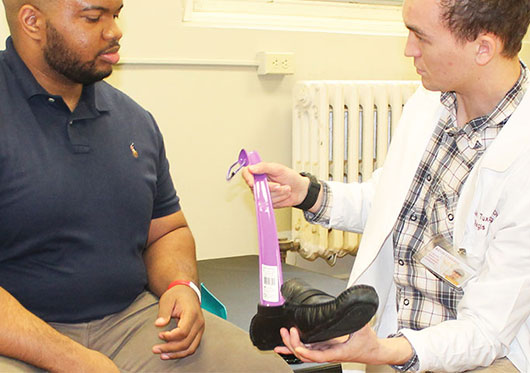If you are considering earning your master’s degree in occupational therapy (MS OT), there is probably a good chance that you are planning to become an occupational therapist after graduation. After all, it’s right there in the name!
But while becoming an occupational therapist is a common career choice for those who earn their master’s degree in occupational therapy, it isn’t the only option available to you. In fact, there are many different career paths in the occupational therapy industry that you may not have considered in the past.
Do you know that you want to work in the occupational therapy industry, but don’t know exactly what job title is right for you? Below, we explore common occupational therapy career paths.
What is Occupational Therapy?
As a field, occupational therapy focuses on treating patients who are recovering from a range of maladies (physical, mental, developmental, and emotional) which impact the person’s ability to perform daily activities. OTs evaluate and treat clients who are limited in performing activities in their daily lives which are important to them, in a range of settings.
Occupational therapy will often aim to help patients develop their fine motor skills, improve hand-eye coordination, learn/relearn basic tasks (like eating, bathing, getting dressed, etc.), and more. The end goal, in all of these pursuits, is to restore the patient’s independence and enhance their overall quality of life.
Each of the careers outlined below interact with patients in different ways, but work towards these same basic goals.
Occupational Therapy Careers to Consider
The careers listed below each typically require that an individual has earned a master’s degree in either occupational therapy or a related field.
1. Occupational Therapist
Average Salary: $84,270 per year ($40.51 per hour)
Required Education: Master’s Degree
What They Do: Occupational therapists evaluate potential patients in order to determine their unique needs, create a treatment plan, and then use a variety of therapeutic and rehabilitation methods to help those patients increase their ability to perform everyday tasks associated with life. They may also identify ways to improve the patient’s everyday environment, such as by adding handrails to walkways, widening doorways to accommodate a wheelchair, etc.
An occupational therapist will typically lead the OT team (which may consist of occupational therapy assistants and aides, depending on the size of the team), and as such will often play a managerial role in addition to their patient-focused work.
In order to become an occupational therapist, an individual must earn their master’s degree in occupational therapy and pass the licensing requirements of the state that they work in.
2. Occupational Therapy Supervisor
Average Salary: $79,818 per year ($41.85 per hour)
Required Education: Master’s Degree
What They Do: Occupational therapy supervisors are responsible for supervising the occupational therapy team within their facility, which may include occupational therapists, assistants, aides, and interns (depending on the size of the facility and team). This may include interviewing job applicants and training employees, evaluating performance, addressing complaints, managing scheduling, and resolving any issues that arise.
They may also perform some direct occupational therapy duties, such as patient evaluations. Typically, occupational therapy supervisors report to the director of rehabilitation.
Because the job requires a thorough understanding of the field of occupational therapy, many supervisors take on the role after spending time as an occupational therapist. As such, they are typically expected to hold at least a master’s degree in occupational therapy, and licensure.
3. Director of Rehabilitation
Average Salary: $90,145 per year ($43.34 per hour)
Required Education: Master’s Degree
What They Do: Directors of rehabilitation (also occasionally called occupational therapy supervisors) are responsible for a number of duties related to planning, coordinating, and directing occupational therapy services. These duties may involve optimizing workflows and internal processes, developing departmental/organizational goals, recruiting and training staff, managing work schedules, managing finances, and more.
Directors of rehabilitation are typically employed by hospitals, nursing homes, rehabilitation centers, clinics, and other facilities which employ large OT teams. Most positions require that candidates hold at least a bachelor’s degree, though graduate degrees are often preferred.
Many who choose to become a director of rehabilitation will have spent a number of years working as an occupational therapist, and therefore hold a master’s degree in occupational therapy. Others may choose to pursue a master’s degree in health administration to enhance their resumes and bolster their managerial credentials.
4. Rehabilitation Liaison
Average Salary: $63,932 per year ($30.74 per hour)
Required Education: Master’s Degree
What They Do: Rehabilitation liaisons (also called intake coordinators or rehab coordinators) are responsible for finding patients to fill the open beds that their clinic or rehabilitation facility has. This will typically involve reading and responding to evaluation orders, evaluating patients on a case by case basis, obtaining patient referrals, admitting patients to fill open beds, and representing their facility at marketing events and social functions.
Though an educational background in occupational therapy is not necessarily required, it can be helpful in finding a rehabilitation liaison job. Because liaisons are responsible for evaluating potential patients, they need to have a clear understanding of what an ideal patient looks like for their services. As such, holding a master’s degree in occupational therapy, physical therapy, or nursing is a great first step towards a job as a rehabilitation liaison. In fact, many liaisons transition to the field after spending a few years performing clinical tasks.
5. Occupational Therapy Assistant
Average Salary: $44,744 per year ($26.29 per hour)
Required Education: Associate's Degree
What They Do: Occupational therapy assistants work under the supervision of an occupational therapist to support patients undergoing rehabilitation. Typically, their duties and responsibilities revolve around ensuring that patients are properly completing the activities outlined in their treatment plans. They may also participate in the process of generating a treatment plan.
Occupational therapy assistants have less responsibility that occupational therapists, but more responsibility than aides. As such, they do not need to earn their master’s degree; in fact, they can often find work simply by earning their associate’s degree from an accredited occupational therapy program.
Job Outlook for Occupational Therapy
Overall, the occupational therapy industry is expected to maintain strong demand and job growth into 2028 and beyond.
According to the Bureau of Labor Statistics (BLS), occupational therapists can expect an 18 percent growth in demand between 2018 and 2028, and occupational therapist assistants and aides can expect a 31 percent growth in demand. Both of these careers drastically outperform the average growth rate of all occupations, which is expected to be around five percent between 2018 and 2028.
There are many factors potentially influencing this demand. One such factor is the fact that people are living longer than ever before, and requiring more supportive services in order to adjust to the challenges commonly associated with aging.
Opportunities in Occupational Therapy
As you can see, becoming an occupational therapist—while a great career choice—is not your only option after earning your master’s degree in OT. There are many other potential careers that you can pursue, which offer more and less responsibility. All of these careers enable you to make a real and lasting impact on the lives of your patients.
Are you considering earning your master’s degree in occupational therapy? Learn more about the different reasons it might be the right move for you.





